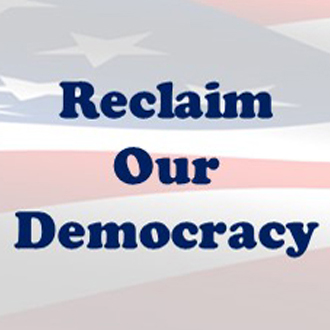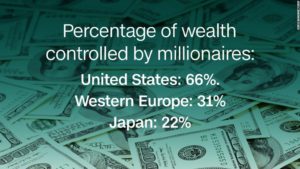Economic Inequality is Increasing in the U.S.
The U.S. is the richest country on earth, with 41.6% of the world’s total global personal wealth (China is in second place with 10.5%), yet more than one fifth of the children in the U.S. live in households with incomes below the poverty line.
To truly understand the amount of wealth inequality in the U.S., please watch this short video, and review these 9 charts.
Economic inequality, the gap between the rich and everyone else, has been increasing over the last three decades in the U.S. And nearly all of the economic gains over the past few years have gone to those at the top.
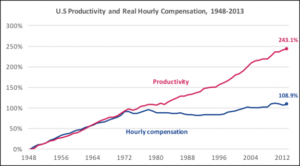
Between 1979 and 2007, paycheck income of the top 1 percent of U.S. earners exploded by over 256 percent, while the bottom 90% of earners have seen little change in their average income. If you would like to learn more about escalating inequality, watch this 24 minute video What the 1% Don’t Want You to Know.
It is important to recognize that as economic inequality grows larger in a society, health and social problems such as drug and alcohol addiction, obesity, life expectancy and social mobility get worse. To better understand the negative impacts of economic inequality watch this 16 minute video How Economic Inequality Harms Societies.
The Influence of Big Money On Our Federal Government
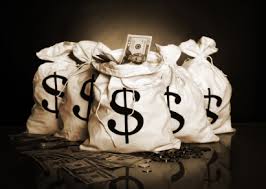 With their enormous monetary contributions to national election campaigns, a fairly small number of very wealthy families are able to exert significant influence on our federal government. Of the top twenty-five largest contributors to the 2020 election, 11 gave huge amounts to Democratic and Liberal causes (between $13 and $152 million), and 14 gave similarly huge contributions (between $13 and $218 million) to Republican and Conservative causes. Our country was founded to have government “of the people, by the people and for the people”, and that is not happening at this point in our history. “We the people” have little voice in how we are governed. Less than 4% of adults made political contributions in 2020. Large donations from corporations, PACS and billionaires now have a much stronger voice in our federal government and many of our state governments. Decisions are made and laws are passed that are driven by their needs, not the needs of the rest of us.
With their enormous monetary contributions to national election campaigns, a fairly small number of very wealthy families are able to exert significant influence on our federal government. Of the top twenty-five largest contributors to the 2020 election, 11 gave huge amounts to Democratic and Liberal causes (between $13 and $152 million), and 14 gave similarly huge contributions (between $13 and $218 million) to Republican and Conservative causes. Our country was founded to have government “of the people, by the people and for the people”, and that is not happening at this point in our history. “We the people” have little voice in how we are governed. Less than 4% of adults made political contributions in 2020. Large donations from corporations, PACS and billionaires now have a much stronger voice in our federal government and many of our state governments. Decisions are made and laws are passed that are driven by their needs, not the needs of the rest of us.
Ever wondered which members of the House and Senate are the most popular among individual donors giving small amounts? This comprehensive list reveals the percentage of campaign money every candidate gets from individuals contributing a total of $200 or less.
What was designed to be a government of checks and balances among its three branches has been corrupted by these moneyed interests, and as a result, our people are suffering the consequences.
Executive Branch
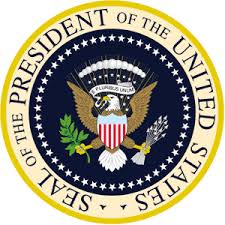 Our previous president was elected in 2016 with fewer popular votes than his main opponent in a contest sullied by huge amounts of money, negative advertising, Russian hacking and ill-timed FBI comments. His main opponent in the election spent over $1 billion in a losing effort, much of it on negative advertising. In some cases corporations and other donors gave millions of dollars to both campaigns, with the hope of buying influence.
Our previous president was elected in 2016 with fewer popular votes than his main opponent in a contest sullied by huge amounts of money, negative advertising, Russian hacking and ill-timed FBI comments. His main opponent in the election spent over $1 billion in a losing effort, much of it on negative advertising. In some cases corporations and other donors gave millions of dollars to both campaigns, with the hope of buying influence.
Legislative Branch
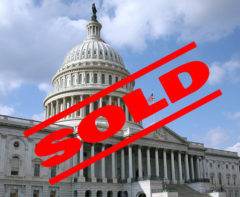 Our legislators work in a system that requires them to spend about half their time raising money. In order to raise the enormous sums of money needed to run for office and stay in office, legislators must turn to corporations, PACS, special interest groups, billionaires, and their own political party joint fundraising committees. In 2020 the top Senate candidate raised more than $138 million and the top House candidate raised more than $34 million. Legislators cannot help but be influenced by the needs of the groups that fund them. They are dependent on this money for their political survival.
Our legislators work in a system that requires them to spend about half their time raising money. In order to raise the enormous sums of money needed to run for office and stay in office, legislators must turn to corporations, PACS, special interest groups, billionaires, and their own political party joint fundraising committees. In 2020 the top Senate candidate raised more than $138 million and the top House candidate raised more than $34 million. Legislators cannot help but be influenced by the needs of the groups that fund them. They are dependent on this money for their political survival.
In working to support the needs of their respective groups of big money contributors, congress has become increasingly divided and unable to govern effectively. In 2017 the former Speaker of the House Paul Ryan admitted that his party spent the prior ten years just saying no to whatever was suggested by the democratic President or other legislators. “Being against things was easy to do. You just had to be against it.” When the Republicans took control of both Houses of government in 2017, the Democrats then did their best to just say no. Legislators on both sides appear unable to explore good ideas, work out compromises and pass good legislation. “We have to do some soul-searching internally to determine whether or not we are even capable of functioning as a governing body,” said Representative Kevin Cramer, Republican of North Dakota.
And the proof of this big money influence is in the 2017 tax bill that was one of the only significant bills passed in Congress from 2017-2020 and signed by the President.
Judicial Branch
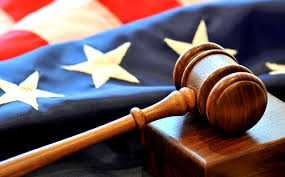 And finally, the branch of government that we turn to for absolute objectivity, the Judicial branch headed by the Supreme Court, has itself made decisions that appear to be driven by moneyed interests. In 1976, in Buckley vs. Valeo, the Supreme Court ruled that spending money to influence elections is constitutionally protected under the First Amendment. In effect saying that money is speech. In 2010 Citizens United vs. Federal Elections Commission, the Supreme Court ruled that there would be no limit on the amount that corporations could spend on political advertising.
And finally, the branch of government that we turn to for absolute objectivity, the Judicial branch headed by the Supreme Court, has itself made decisions that appear to be driven by moneyed interests. In 1976, in Buckley vs. Valeo, the Supreme Court ruled that spending money to influence elections is constitutionally protected under the First Amendment. In effect saying that money is speech. In 2010 Citizens United vs. Federal Elections Commission, the Supreme Court ruled that there would be no limit on the amount that corporations could spend on political advertising.
If you would like to learn a bit more about the current situation, read this excellent article Liz Kennedy: Corporate Capture Threatens Democratic Government.
It is very clear that big moneyed interests have an enormous influence on our government. Please read the next section How Did this Happen? to better understand why we are in this situation.
